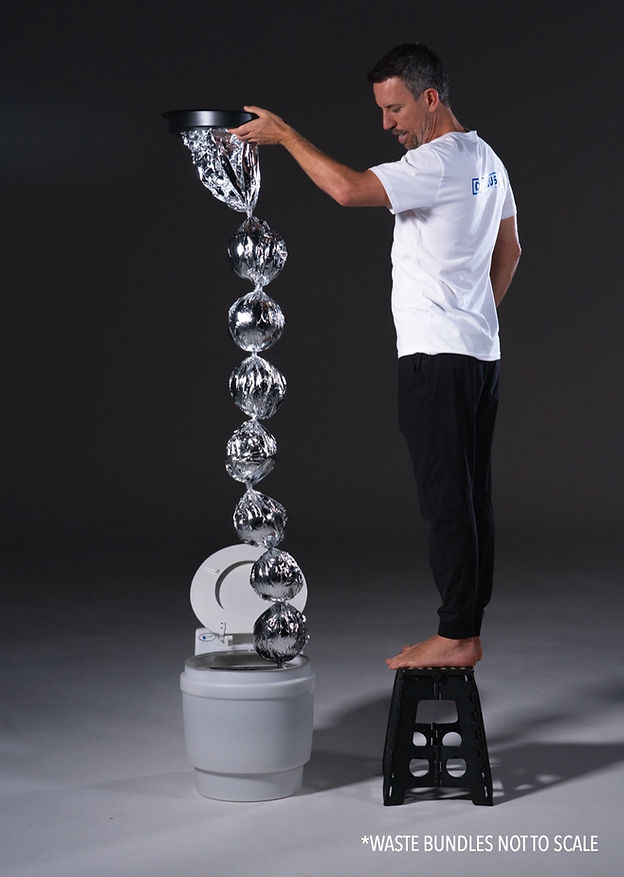Self-Containment
In New Zealand, the regulation of self-contained vehicles has been a significant topic, especially with the introduction of new legislation and standards aimed at promoting responsible freedom camping and protecting the environment.
To achieve self-contained certification for a van in New Zealand, owners must meet specific criteria that ensure the vehicle can support its occupants' ablutionary and sanitary needs for at least three days without relying on external facilities. The key parameters and requirements for self-contained certification include:
Water Supply:
A sufficient fresh water supply must be available within the vehicle to last for a minimum of three days for all occupants.
Waste Water Storage:
The vehicle must have adequate grey and black water storage capacity to hold all waste water for at least three days. Grey water pertains to waste water from sinks and showers, while black water relates to sewage from toilets.
For the Dry Flush toilet this means ensuring that you have sufficient refill cartridges for 3 days. So similar to ensuring your water tanks are full, you need to ensure you have packed bags to accommodate the people on board.
Fixed Toilet:
A permanently fixed toilet is a crucial requirement. The toilet must be accessible at all times, even when the bed is made up if the van includes sleeping facilities. It must be permanently fixed in place, something that is achievable with the extra mounting bracket for Dry Flush toilet. Some inspectors also like to see your toilet installed on a water proof membrane or wet area.
Sanitary Facilities:
Beyond the fixed toilet, the van must have suitable facilities for the occupants to maintain hygiene, including handwashing facilities within the vehicle.
Rubbish Disposal:
There must be a sealable container for the temporary storage of rubbish.
Ventilation:
Update to Regulations – August 2024
The Government has updated the Plumbers, Gasfitters and Drainlayers (Self-Contained Vehicles) Regulations 2023 (the Regulations). The updated Regulations come into force on 29 August 2024.
The amended Regulations are:
Only permanently fixed wastewater storage tanks are required to be directly ventilated to the exterior of the motor vehicle.
See MBIE's Update to the Regulations here.
This has also been accurately summarised below by the New Zealand Motor-Caravan Association.
"The Government has amended the Plumbers, Gasfitters and Drainlayers (Self-Contained Vehicles) Regulations 2023 so that campers with fixed cassette-type toilets in their vehicles are not required to install ventilation kits if they want a green warrant card for freedom camping purposes. Fixed toilets must be installed in accordance with their design and specifications. Therefore if, for example, your manufactured waterless/composting toilet comes with a ventilation kit, that still must be installed." - see their website linked here.
This means that in line with manufacturer's instructions, the Laveo Dry Flush toilet does not need to be vented.
See the Notice of Approval for the Dry Flush toilet linked here and below.
Self-Containment Certification:
Obtaining the self-containment certification involves a formal inspection by a qualified certifying officer who assesses whether the vehicle meets all the required standards. This certification process ensures that the vehicle is equipped to prevent any discharge of waste into the environment, safeguarding public health and natural resources.
See the Notice of Approval for the Dry Flush toilet just below, and see the bottom of the article for links on getting certification. The parts on ventilation have now been updated, as ventilation of the Dry Flush is no longer required for Green Sticker certification.
Regulation Changes in New Zealand
The Self-contained Motor Vehicles Legislation Act came into force on June 7, 2023, marking a pivotal change in the certification process for self-contained vehicles. This new legislation, coupled with the Self-containment Regulations published by the Ministry of Business, Innovation and Employment (MBIE) at the end of August 2023, outlines the requirements for vehicles to be certified as self-contained.
From December 7, 2023, vehicle owners have the option to certify their vehicles under these new regulations or continue with the existing standard, NZS 5465, until June 6, 2024. This transitional period allows for a smooth shift to the new regulations. The New Zealand Motor Caravan Association (NZMCA) plays a crucial role in this transition, planning to apply to become a certification authority under the new regulations. However, it anticipates beginning the certification process under the new standards around April/May 2024, after upgrading its IT systems and training its volunteer and commercial testing officers.
One of the notable aspects of the new legislation is its focus on vehicles with permanently fixed toilets for certification. This move aims to address community concerns about waste disposal by ensuring that self-contained vehicles are equipped to manage their waste efficiently, thus protecting public health and the environment. Vehicles with portable toilets, which make up about 8% of NZMCA members' vehicles, face a challenge under the new regulations, prompting the development of a parallel certification system to accommodate these members.
The Laveo Dry Flush is fortunately able to be fixed in place using a mounting bracket to ensure compliance with this requirement.
The NZMCA continues to encourage vehicle owners to certify their motor caravans or caravans in accordance with the existing New Zealand Standard for Self-Containment of Motor Caravans and Caravans, NZS 5465:2001. This certification indicates that a vehicle can meet the ablutionary and sanitary needs of its occupants for at least three days without external services or discharging waste, ensuring that wastewater is disposed of safely at approved dump stations.
These changes reflect New Zealand's commitment to sustainable tourism and responsible freedom camping, balancing the freedom of campers with the need to protect the country's natural landscapes and communities from the adverse effects of indiscriminate waste disposal.
Getting Certified and Further Help
For van owners looking to get their vehicles certified as self-contained, they must reach out to a recognized certification authority. The New Zealand Motor Caravan Association (NZMCA) is actively assessing and issuing Green Stickers as of January 2025. We have seen a number of Dry Flush go through this process already this year and get their Green Sticker approval.
NZ Lifestyle Camping also provide certification inspection services across the North and South Island. For more detailed information on the process and to find certification locations, van owners in New Zealand can visit dedicated resources like NZ Lifestyle Camping, which provides region-specific guidance and support for both the South Island and the North Island. These resources can be invaluable for those looking to navigate the certification process and ensure their vehicles meet the required standards for self-contained certification.
For the South Island, you can visit NZ Lifestyle Camping - South Island for more information.
For the North Island, information is available at NZ Lifestyle Camping - North Island. -
These options should offer guidance on the certification process, locations where you can get your van certified, and additional support for van owners to meet the necessary requirements for self-contained certification.
You can also call me anytime for any questions on 0800 124 227, happy to help!
Happy Camping!





